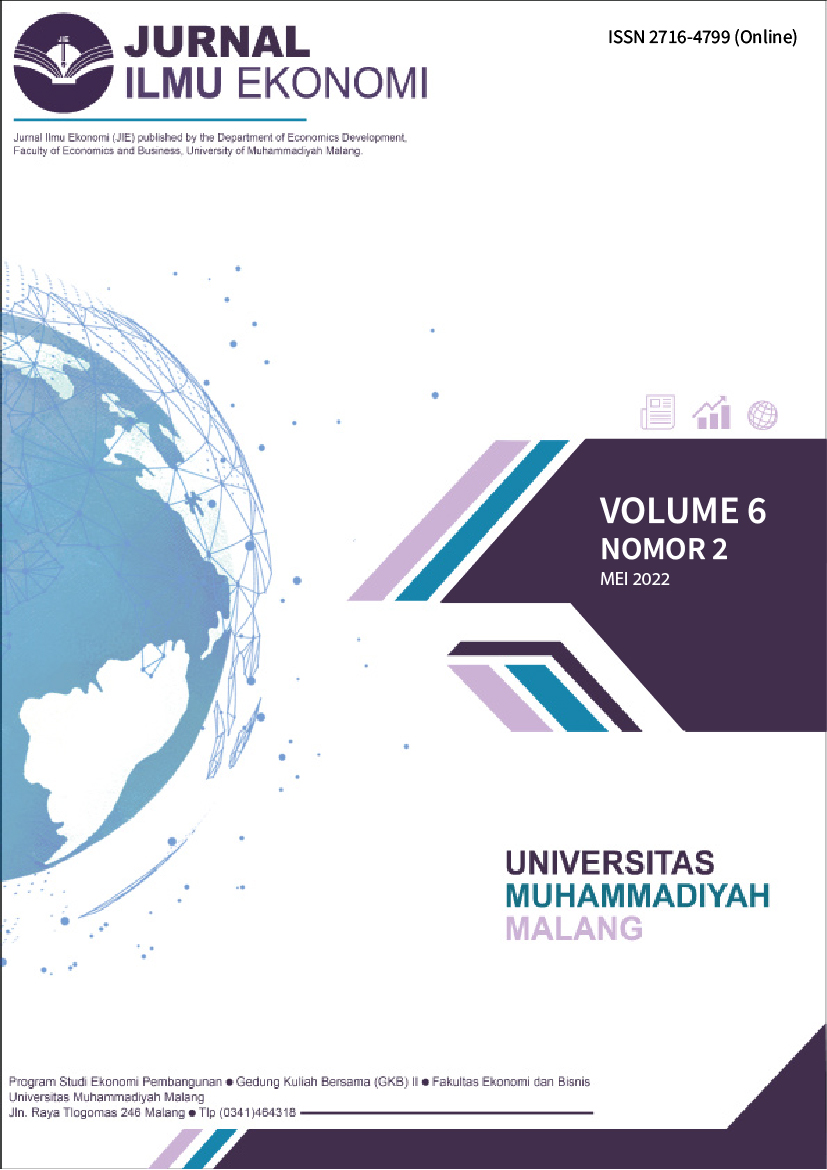Analisis Pengaruh ADD, IPM, Dan Jumlah Tenaga Kerja Terhadap Pertumbuhan Ekonomi Kabupaten Lamongan
DOI:
https://doi.org/10.22219/jie.v6i2.20631Keywords:
village fund allocation, human development index, labor, economic growthAbstract
The purpose of this research is to analyze the effect of village fund allocation, human development index, and number of workers on economic growth. This research was conducted in Lamongan Regency. The results of this research shows that simultant test (F-test all independent variables had an effect on Economic Growth. The results of the partial test (t-test) show that the Village Fund Allocation has a positive and insignificant effect on Economic Growth, the Human Development Index has a significant negative effect on Economic Growth. While the number of workers has a significant positive effect on economic growth.
Downloads
References
Brata, A. G. (2002). Pembangunan Manusia dan Kinerja Ekonomi Regional Di Indonesia. Jurnal Ekonomi Pembangunan, 7(2), 113–122.
Darsyah, M. Y. (2014). Klasifikasi Indeks Pembangunan Manusia (IPM) dengan Pendekatan K-Nearset Neighbor (K-NN). Seminar Nasional Pendidikan Sains dan Teknologi. Semarang: Fakultas Matematika dan Ilmu Pengetahuan Alam Universitas Muhammadiyah.
Dewi, N. L. S., & Sutrisna, I. K. (2014). Pengaruh Komponen Indeks Pembangunan Manusia Terhadap Pertumbuhan Ekonomi Provinsi Bali. E-Jurnal Ep Unud, 3(3), 106–114.
Dinarjito, A., & Dharmazi, A. (2020). Pengaruh Desentralisasi Fiskal, Investasi, dan Indeks Pembangunan Manusia terhadap Pertumbuhan Ekonomi Regional di Provinsi Kalimantan Timur. Jurnal Pajak Dan Keuangan Negara (Pkn), 1(2), 57–72.
Handayani, A. P. (2017). Pengaruh Alokasi Dana Desa dan Belanja Modal terhadap Kemiskinan dan Kesejahteraan Masyarakat dengan Pertumbuhan Ekonomi Sebagai Variabel Intervening di Indonesia. Tesis. Yogyakarta: Program Pascasarjana Magister Akuntansi Sekolah Tinggi Ilmu Ekonomi YKPN Yogyakarta.
Hidayat, A. S., & Nalle, F. W. (2017). Analisis Pengaruh Belanja Pemerintah, Tenaga Kerja, dan Pendapatan Asli Daerah Terhadap Pertumbuhan Ekonomi Regional Provinsi Jawa Timur Tahun 2010-2015. Jurnal Ekonomi Pembangunan, 15(1), 71-86.
Ishak, M., & Hasan, A. (2018). Pemanfaatan Alokasi Dana Desa terhadap Pemberdayaan Masyarakat dan Kelembagaan Desa. Bongaya Journal For Research In Accounting, 1(1), 9–10.
Kaul, I. (1995). Human Development Report 1994. American Journal of Economics And Sociology, 54(1), 1-230
Menajang, H. (2019). Pengaruh Investasi dan Tenaga Kerja terhadap Pertumbuhan Ekonomi Kota Manado. Jurnal Pembangunan Ekonomi dan Keuangan Daerah, 16(4), 1-18.
Nurhuda, H. I. (2019). Analisis Faktor-Faktor yang Mempengaruhi Pertumbuhan Ekonomi di Karesidenan Madiun pada Tahun 2014-2017. Skripsi. Surakarta: Program Studi Ekonomi Pembangunan Fakultas Ekonomi dan Bisnis Universitas Muhammadiyah Surakarta.
Priyono, & Ismail, Z. (2012). Teori Ekonomi. Surabaya: Dharma Ilmu.
Purnamasari, S. A., Rostin, & Ernawati. (2017). Pengaruh Investasi dan Tenaga Kerja Terhadap Pertumbuhan Ekonomi di Provinsi Sulawesi Tenggara. Jurnal Progres Ekonomi Pembangunan (Jpep), 2(2), 1–14.
Rimawan, M., & Aryani, F. (2019). Pengaruh Alokasi Dana Desa terhadap Pertumbuhan Ekonomi, Indeks Pembangunan Manusia serta Kemiskinan di Kabupaten Bima. Jurnal Ilmiah Akuntansi dan Humanika, 9 (3), 287–295.
Rusydi & Sahid. (2017). Pengaruh Transparansi Alokasi Dana Desa (ADD) dan Kebijakan Pemerintah Desa terhadap Kesejahteraan Masyarakat Desa di Kabupaten Takalar. Jurnal Organisasi Dan Manajemen, 5(1), 10–22.
Yuniana, E. (2018). Analisis Pengaruh Indeks Pembangunan Manusia, Tenaga Kerja, dan Tabungan terhadap Produk Domestik Regional Bruto Pada Kabupaten dan Kota di Provinsi. Skripsi: Jurusan Ilmu Ekonomi Fakultas Ekonomi Universitas Islam Indonesia Yogyakarta.
Downloads
Published
How to Cite
Issue
Section
License
Copyright (c) 2022 Dicky Angga Nugraha Pradana, Dwi Susilowati

This work is licensed under a Creative Commons Attribution-ShareAlike 4.0 International License.
Authors who publish with this journal agree to the following terms:
- For all articles published in the JIE (Jurnal Ilmu Ekonomi), copyright is retained by the authors. Authors give permission to the publisher to announce the work with conditions. When the manuscript is accepted for publication, the authors agree to the automatic transfer of non-exclusive publishing rights to the publisher.
- Authors retain copyright and grant the journal right of first publication with the work simultaneously licensed under a Creative Commons Attribution-NonCommercial-ShareAlike 4.0 International License that allows others to share the work with an acknowledgement of the work's authorship and initial publication in this journal.
- Authors are able to enter into separate, additional contractual arrangements for the non-exclusive distribution of the journal's published version of the work (e.g., post it to an institutional repository or publish it in a book), with an acknowledgement of its initial publication in this journal.
- Authors are permitted and encouraged to post their work online (e.g., in institutional repositories or on their website) prior to and during the submission process, as it can lead to productive exchanges, as well as earlier and greater citation of published work (See The Effect of Open Access).
This is an open access article and licensed under a Creative Commons Attribution-NonCommercial-ShareAlike 4.0 International License








